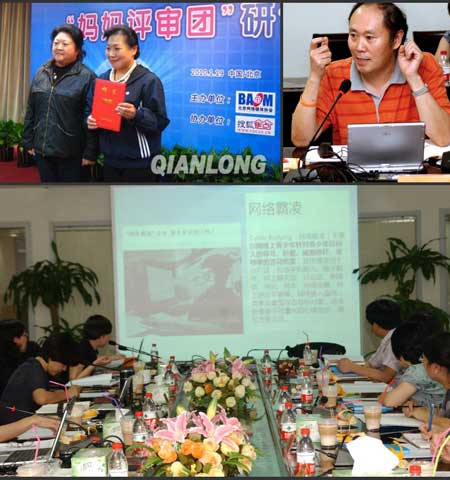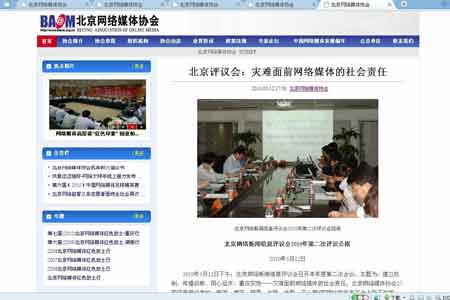BAOM: an example of online self-regulation
In recent years, under the guidance of the Ministry of Industry and Information Technology, the State Council Information Office, and the State Administration of Radio, Film, and Television, the Beijing Association of Online Media (BAOM) and other Internet media organizations have developed the practice of self-regulation.
|
|
|
Volunteer groups of mothers help the authorities monitor the Internet for harmful content. |
Build a complete regulation system
BAOM has a range of industry self-regulation systems, including an Information Council, Internet regulation volunteers and volunteer groups of mothers.
|
|
|
The BAOM Information Council holds a meeting. |
In May 2006, BAOM recruited 200 volunteers nationwide to monitor the Internet for illegal and harmful information. In 2010, a volunteer group of mothers was founded, marking the extension of the council system to the protection of teenagers.
BAOM released suggestions on recruiting self-regulation commissioners at the third session of the Information Council on August 27, 2010. Eight famous websites, including Sohu and Sina, promised to implement the suggestions immediately.
Brand building activities
BAOM has held a serious of brand building activities, including seven trips to old revolutionary bases, six China Internet Media Football Competitions, three Spring Festival evening events, and one Spring Festival activity.
|
|
|
Spring Festival Evening Event |
Since its first trip to the Jinggang Mountain revolutionary base in 2004, BAOM has successfully organized trips to other revolutionary bases, including Yan'an, Zunyi, Baise, Yunling, Shaoshan and Chongqing.
During the 2010 Spring Festival, BAOM has cooperated with 9 famous websites to co-produce a huge show to celebrate the Year of the Tiger. It received over 260,000,000 clicks and 15,480,000 messages of support. The audience came from 27 provinces of China and overseas countries including Japan, America, Singapore and Australia.
Receiving legal support
Self-regulation organizations should be non-profit organizations, publicly managed and regulated. But in China such organizations have a dual character, both official and non-governmental, which can create internal conflict and urgently needs to be reformed.
Ethical standards are weak without legal protection. The objective of these social organizations is not to weaken government management, but to build a stronger interactive relationship between law enforcement and the self-regulatory system of these organizations. In 2005, the State Council Information Office and the Ministry of Information Industry released Regulations for Administering the Internet News and Information Services, which provides legal support to media self-regulation.
In 2008, the Hong Kong sex photo scandal spread rapidly around the Internet. Although it happened during the Spring Festival, BAOM immediately activated its council system, praised Sohu for not publishing the sex photos, severely criticized Baidu for allowing key word searches to locate the material, and asked Baidu to apologize to the society. The Beijing Internet Management Office punished Baidu in accordance with the Regulations for Administering the Internet News and Information Services.
The six years of BAOM's existence have been a time of rapid development for China internet media. In 2009, BAOM was named one of the Advanced Group of Beijing Organizations, in recognition of its accomplishments with regard to the development of Beijing, and especially its important role during Beijing Olympics and earthquake relief work.
BAOM is considered an example in the field of self-regulation. It is the product of China's Internet media development and China's national conditions. I hope this example will be of assistance to other media self-regulation organizations.
The author Chen Hua is executive director of Beijing Association of Online Media
(This article was translated by Lu Na)
 0
0 









